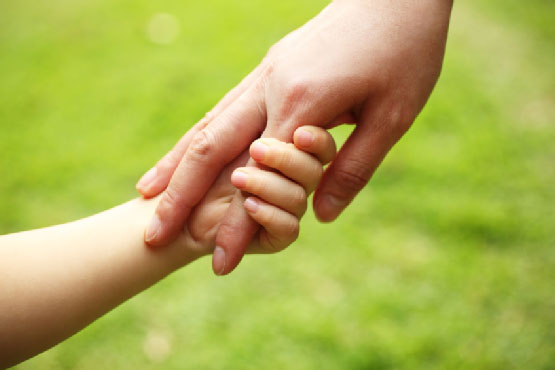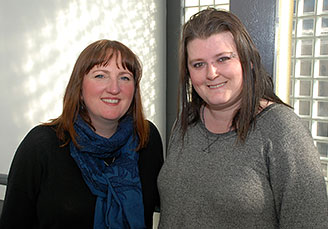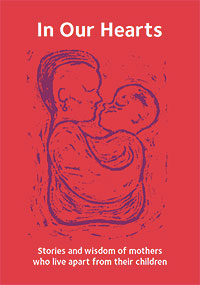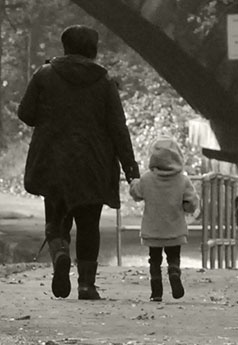Living apart – mothers whose children have been taken into care

Tue, 04 Nov 2014 15:37:00 GMT
Masters student Siobhan Beckwith has compiled a book about the plight of mothers living apart from their children

Pictured right: Siobhan Beckwith, Master's degree student at the University of Huddersfield (stood left), with one of the book's authors Anne Crosbie.
MOTHERS who live apart from their children often suffer serious grief and trauma. Meeting others in the same situation and sharing stories can help with the mental healing process. Now a University of Huddersfield researcher has played a key role in compiling and publishing a new book in which dozens of women describe their experiences and how they came to terms with their predicament.
Siobhan Beckwith – who has long experience working in the field of mental health – leads a project named Mothers Living Apart from their Children that is based within the Kirklees WomenCentre in Huddersfield. She is also completing a Master’s degree at the University of Huddersfield in which she examines the narratives of women parted from children and the lessons to be learned from their stories.
Although Siobhan has written an introduction and provides some commentary in the new book – entitled In Our Hearts – Stories and Wisdom of Mothers Living Apart from Their Children – she stresses that it belongs to its almost 50 contributors, who write about the problems that led to their children being taken into care as well as stories and reflections about their lives since the separation.
Losing children can be devastating
 Those problems include drug addiction, domestic violence and mental health issues, said one of the authors, Anne Crosbie (pictured above with Siobhan). In her case, addiction problems – which she continues to work on – contributed to her now-teenage daughters being adopted and her young son living with her sister. She has regular contact with her son and is now back in touch with her daughters.
Those problems include drug addiction, domestic violence and mental health issues, said one of the authors, Anne Crosbie (pictured above with Siobhan). In her case, addiction problems – which she continues to work on – contributed to her now-teenage daughters being adopted and her young son living with her sister. She has regular contact with her son and is now back in touch with her daughters.
She joined and became an active member of the group facilitated by Siobhan and contributed her narrative to In Our Hearts. The experience of losing children can be devastating, said Anne, but the process of writing about it was cathartic.
The book is not solely a succession of sad stories, she stressed. “There is a positive outlook as well,” said Anne, although Siobhan added that the focus of the book is around the wellbeing of the mother rather than the quest to have your children returned to your care. “For many mums, that won’t be the case,” she says, “it is about how you move forward and having a role in your children’s lives in whatever way you can.”
Siobhan has been working with WomenCentre Kirklees for some 15 years. About six years ago, after conversations with women about their grief and trauma at being parted from children, and their frustrations with the legal and social care systems, she began to form the Mothers Living Apart from Their Children group. Alongside the group, she developed a programme named Make Sense, probably unique it its field.
“The idea was to develop a model around which supported women can explore their own separation, feelings of guilt and shame and place importance on their wellbeing. The sessions create a space in which women could tell their stories and listen to others,” explained Siobhan.
 Student engagement
Student engagement
Prior to her Master’s project, Siobhan began other collaborations with the University of Huddersfield. She and the group deliver lectures so that experiences of the mothers living apart from their children support the development of undergraduate and postgraduate social workers. The teaching encourages students to consider the impact of having to work with professionals alongside the issues which have led to being apart from their children. This year they are also extending their remit to working with postgraduate midwives and health visitors as part of the Advanced Safeguarding qualification.
“I have had good social workers and some who were not so good,” said Anne Crosbie. Her definition of a “good” social worker is “someone who is open and honest”.
The key message of the book, Anne and Siobhan agreed, was around hope, that every individual story is different and encourage the reader to go beyond the basic facts of every story and see the strengths of the authors.







